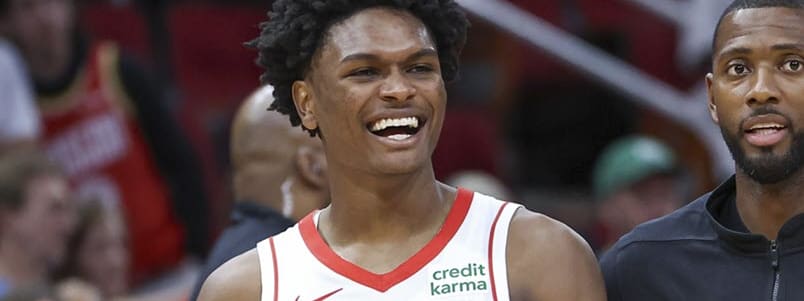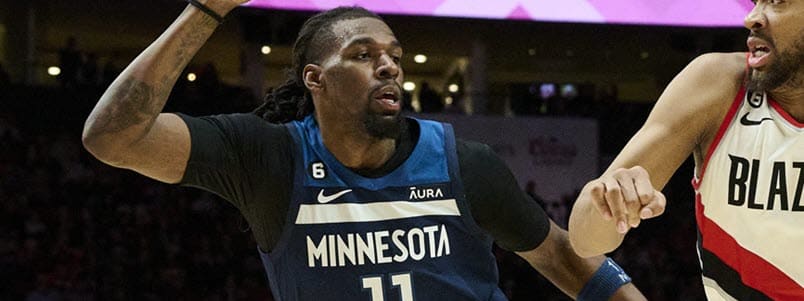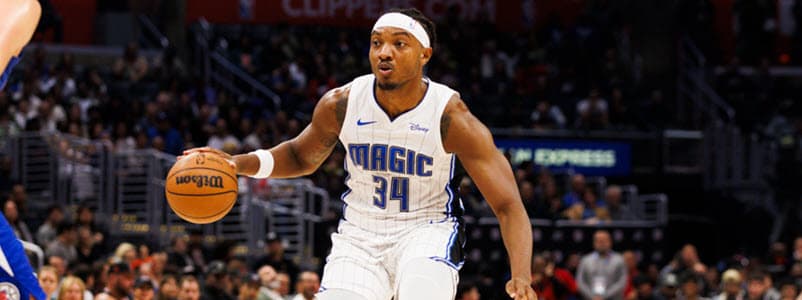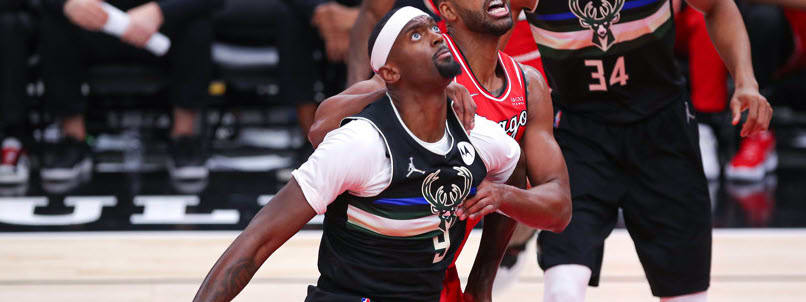Recent RotoWire Articles Featuring Jeff Green
See More
As a well-traveled veteran of the NBA, Green finds himself suiting up for the Rockets for the second time in his career, after a short stint during the 2019-20 season. Now aged 37, Green is certainly on the backend of his career, although he should still be able to provide limited value on a young Rockets squad. He played 19.5 minutes per game during the 2022-23 season as a member of the Nuggets, averaging 7.8 points and 2.6 rebounds. It's safe to assume he will have a larger impact in the locker room, providing leadership and experience, in the hope of avoiding bad habits given their recent lack of success. From a fantasy perspective, Green is best left on the waiver wire in just about every format.
With both Jamal Murray and Michael Porter Jr. slated to be ready for opening night, Green could see his role reduced. Given that he finished as the 251st ranked player in a favorable situation, it is hard to see him topping that mark this season. In 25 minutes per game, Green compiled 10.3 points, 3.1 rebounds and 0.4 blocks. A healthy roster will likely see him shift to a 20-minute role, and even that could be on the high end. Managers should look at him as a deep league asset only.
Last season in Brooklyn, Green posted 11.0 points, 3.9 rebounds, 1.6 assists and 1.5 threes per game while playing 27.0 minutes. It was yet another steady-but-unspectacular year for the veteran, who helped compensate for Kevin Durant missing more than half of the regular season due to injury. Green joined the Nuggets in free agency and will likely hold a similar reserve role behind Aaron Gordon and Michael Porter Jr. The Nuggets have solid depth at the forward spots, so Green may not match last season's minutes figure, but his reliability and experience should earn him a consistent spot in the bench rotation.
Green had a relatively successful 2019-20 season. He spent his first 30 appearances with the Jazz, where he struggled, but then he was waived and subsequently signed by the Rockets. With Houston, Green seemed to find his role, averaging 12.2 points on 56.4 percent shooting, 2.9 rebounds and 1.7 assists in 22.6 minutes. He was great in the playoffs, too, averaging 11.6 points on 49.5 percent shooting, 5.0 rebounds and 1.6 assists in 28.4 minutes. He won't be back with the Rockets this season, as Green signed a one-year, $2.6 million contract with the Nets. The 34-year-old might struggle to see the kind of role he did in Houston. At forward, he'll be competing with the likes of Kevin Durant, Joe Harris, Caris LeVert, Landry Shamet and Taurean Prince. Given his murky role, Green should not be a target in the vast majority of redraft fantasy leagues.
Green joined the Wizards last season after a one-year stint with the Cavaliers, and the 12-year veteran started 44 games in 2018-19 -- his most starts since the 2013-14 season. Green shot a respectable 47.5 percent from the field and drilled 1.4 threes per contest on 34.7 percent shooting from deep. Green has shot well for the last two seasons, and it seems his down year in Orlando in 2016-17 was an outlier. His 12.3 points were his most since the 2014-15 season, and he added 4.0 rebounds and 1.8 assists in 27.2 minutes. Those minutes will likely decrease this season, playing for a title contender in Utah rather than a floundering lottery team in Washington. Green could contend for 20 minutes a night, but he's primarily a quality depth addition on a loaded roster who is unlikely to make huge contributions. The Jazz boast a lot of talent at the forward position in Joe Ingles, Bojan Bogdanovic and Royce O'Neale, and Green will almost certainly be more valuable in real-life basketball as a smart veteran than in fantasy basketball as a reserve.
After a brutal one-year stop in Orlando where Green shot just 39.4 percent from the field and 27.5 percent from deep, Green opted to join the title-contending Cavaliers, where he enjoyed some improvements overall offensively. He significantly upped his field goal percentage to 47.7 percent and saw a slight uptick from three-point land with a 31.2 percent clip. However, Green was still only a reserve and averaged just 10.8 points, 3.2 rebounds and 1.3 assists across 23.4 minutes. That kept the 31-year-old off the radar in most season-long leagues and only made him a punt-play in DFS tournament at times. With the departure of LeBron James from Cleveland, Green opted to head elsewhere as well to find another playoff contender. He ultimately inked a one-year, $2.39 million contract with Washington, where he's set to once again serve as depth at small forward and power forward. Otto Porter and Markieff Morris are locked into starting roles, which means Green will have to battle with the likes of Kelly Oubre, Jason Smith and rookie Troy Brown for minutes. As a result, Green's playing time isn't expected to go up, which should limit his utility in most Fantasy leagues once again.
Green was one of the bigger surprises in free agency a season ago, locking in a one-year, $15 million contract with the Magic. He didn't necessarily have the production of someone being paid that salary, however, and he ended up playing just 22.2 minutes per contest. What was most concerning was Green's struggles shooting the ball. He shot career-lows of 39.4 percent from the floor and just 27.5 percent from the three-point line, essentially eliminating his value for both the Magic and Fantasy owners. He completed the season with averages of 9.2 points, 3.1 rebounds and 1.2 assists. Green will now enter his 10th NBA season with the Cavaliers after being signed to a $2.3 million contract for the upcoming campaign. Green is expected to battle for reserve minutes at both small forward and power forward, though with guys like Jae Crowder, Kyle Korver and Richard Jefferson all in play, he doesn't have a direct path to playing time. Green is going to have a tough time reaching the 22.2 minutes he saw with the Magic and while his shooting percentages could increase, it likely won't be enough to make him a valuable Fantasy option in the majority of leagues.
In his seventh season, Green averaged 13.1 points, 4.2 rebounds, 1.8 assists, 0.6 steals, and 0.5 blocks in 30 minutes per game during 45 regular season games with the Grizzlies. With a less demanding offensive role than he had on the Celtics, his scoring average dipped post-trade, but he was still somewhat efficient, scoring 13.1 points on 10.9 field goal attempts per game. Green shot 43 percent from the field, 36 percent from beyond the arc, and 83 percent from the free-throw line with the Grizzlies during the regular season. However, he struggled badly in the playoffs, managing only 8.9 points, 4.7 rebounds, 1.7 assists, 0.5 steals, and 0.5 blocks in 27 minutes per game on 33 percent from the field, 22 percent from downtown, and 85 percent from the charity stripe. The Grizzlies' acquisition of Matt Barnes means that Green might also need to carve out considerable time at the four if he hopes to maintain last year's 30 minutes per game load.
Green entered the 2013-14 season as "the man" in Boston. After finishing off the previous season with two strong months, Green was set to lead the Celtics without the departed Kevin Garnett, Paul Pierce, and the injured Rajon Rondo. Green didn't fare well as opponents' primary target. He finished with a career-high 16.9 points per game, but his shooting percentage took a hit (41 percent overall, 34 percent three-pointers), while he hoisted a career-high 14.3 shots per game. If he's not going to be a pure scorer, Green needs to do other things, but that doesn't seem like it's in his wheelhouse. He averaged 4.6 rebounds, 1.7 assists, 0.7 steals, and 0.6 blocks in 34 minutes per game. It's become apparent that Green is more of complementary piece, which is frustrating because he's capable of more. Some of his disappointing play had to do with having a roster full of new faces and the experimentation that came along with it, but he's getting paid to produce more – and more consistently. A full season with Rondo might help, but entering his walk year, Rondo's not a guarantee to survive the entire season with Boston. And Green might not be long for the city. He's got two years left on his deal ($9.2 million per season), but the Celtics might listen if a contender comes calling. They've added a couple of bodies – free agent Evan Turner and draft pick James Young – that can play the small forward spot. Green will open the season as the starting three and should once again be among the team's leaders in shots.
Green is someone who could win some leagues this year if he goes late enough in drafts. He's a difficult guy to project in 2013-14, not only because key cogs, Paul Pierce and Kevin Garnett are gone, but because he has the stigma of a guy that will disappear from game to game. However, when he is given plenty of looks and asserts himself, the rewards for fantasy owners are fantastic. Consider, in a March 18 game against the Heat last season, Green had 43 points, seven boards, two steals, four blocks and five three-pointers with Kevin Garnett out of the lineup. Sure, that's a cherry-picked box score, but small forwards that can go for 43 points against a healthy Heat team don't necessarily grow on trees. Green enters 2013-14 as the wing man to the most unselfish star in the league, Rajon Rondo, and the lone credible scoring option on a young Celtics team. He started just 17 games last year, yet now he'll be the go-to option. It's hard to find a guy with more upside than that. With a shooting line of .467/.385/.808 last season, we know Green won't do much damage to any rate stats. We can also look at 2009-10 when Green averaged a career-high 37 minutes per game and subsequently averaged a career best 1.3 steals and 0.9 blocks per game. I think that's the low-end of what to expect from him on defense this year. The one area where Green will fail to match his contemporaries is assists, as he's never averaged better than 2.0 per game in a season.
Green enters the season healthy after missing all of 2011-2012 with an aortic aneurysm. Once a legitimate threat to drop twenty points any night, Green is now more akin to Greg Oden and other injury-riddled busts. However, don't write Green off just yet. He returns to a Celtics squad in dire need of experienced forward play off the bench, something Green can readily supply. Expect a motivated Green to be a decent source of scoring and rebounding in deeper leagues.
By now, you must have heard that Green will not be playing this season because of an aortic aneurism. The Celtics will void the one-year contract he signed in December and they retain his rights for next season. He’s expected to make a recovery and resume his career in 2012. As Green recovers, the Celtics will determine if he’s part of the core group going forward.
Green isn't a prototype power forward – at 6-9 and 235 pounds, he's more of a four in a three's body. But he's a heady player with the athleticism to out-quick most opposing bigs – especially when he takes them out to the perimeter – and because he shares a lineup with Kevin Durant and the rapidly emerging Russell Westbrook, Green rarely gets a ton of attention from opposing defenses. As a fantasy option, Green doesn't really excel in any one area – he scored just over 15 points per game last season, grabbed six boards and averaged just over two combined blocks/steals; his value is tied to his across-the-board production. And his outside shooting – over 100 made threes in 2009-10 – is a nice bonus. Green will be 25 when the season begins, and should just be entering his prime, so continued development and improvement is to be expected, though it will be interesting to see whether there's any after-effect to his spending the summer working out with Team USA in advance of the World Championships in Turkey.
Predictably, Green showed marked improvement during his sophomore campaign last year, averaging 16.5 points, 6.7 rebounds, 2.0 assists and 1.0 steals. The big gain occurred from downtown, as he went from making 0.3 three pointers per game during his rookie season to nailing 1.2 on average in 2008-09. Green’s game doesn’t stand out in any one area, but he’s an effective player with plenty of room for further growth. Having Kevin Durant as a teammate only helps, as he’ll never face the opponents’ best defender or see double teams. Russell Westbrook is fast developing into one of the better point guards in the NBA, and the Thunder have the makings of a sneaky-productive offensive team. Green isn’t all that big for a power forward, but he’s quicker than most, and because he can take advantage away from the basket, he’s often a mismatch for opposing defenses. In an effort not to overwork the sophomore, Oklahoma City cut back Green’s minutes toward the end of last season, but his production in February alone (20.5 ppg, 9.5 rpg, 2.7 apg, 1.2 spg, 1.3 3PT) shows the kind of upside he possesses.
The season totals for Green’s rookie year really don’t tell the whole story – his 10.5 points and 4.7 boards per game are far less impressive than the 15.6 and 6.3 he posted while averaging 37 minutes in April. With a season’s worth of NBA experience under his belt, his improvement will continue. On an Oklahoma City team in the midst of a youth movement, we expect Green to get the bulk of his minutes at the four spot this year, with rookie Russell Westbrook taking over at the two and Kevin Durant moving to his more natural three position. Playing closer to the basket should mean more rebounds for Green this year. Our only concern is him getting caught up in a forward rotation that’s starting to look a bit crowded – with veterans like Chris Wilcox, Nick Collison and newly-acquired Joe Smith and Desmond Mason all in the mix.
Green is in many ways reminiscent of last year’s Rookie of the Year, Brandon Roy – a young player with a very mature game. One of the keys to Georgetown’s Final Four run last season, Green has the size to play either forward position, a good mid-range jumper, the ability to score in the paint and is a very good passer. Green’s court smarts and defensive ability should make him an immediate favorite of new Sonics coach P.J. Carlesimo. We expect him to contribute immediately as part of a forward tandem with Kevin Durant, and to be one of the more valuable rookies this season.













